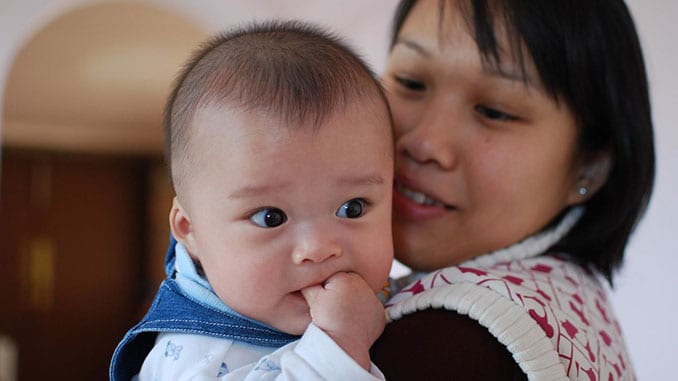
Most of the time there is no need to panic.
Published: August 31, 2019
By: Lori Chandler Pruitt
It’s natural for infants to suck their thumb or fingers, or a pacifier. For many babies and young children, the habit helps them feel secure and safe, especially in unfamiliar environments, and may help them sleep.
It’s great for parents too, at first – but as the child grows older, many parents become worried that their child may never stop – or that the habit will ruin their child’s teeth and mouth. When is it harmful? What age should your child stop? What if they will not stop?
According to the American Dental Association, most of the time there is no need to panic. Most children stop such habits on their own between the ages of two and four. As kids get older, they spend more time doing other things, and school-aged peer pressure often causes many to stop.
“Sucking on fingers and pacifiers is normal for babies and very young children,” says Olga M. Sanchez-Hernandez DMD, MS, MS, of McCalla Orthodontics and Pediatric Dentistry. “Most children discontinue these habits on their own and if it happens in a timely manner, no effects are observed.” But the longer the habit persists, the more it could affect the development of teeth and jaws, and the more orthodontic treatment will be needed, Sanchez-Hernandez says. Prolonged thumb sucking may cause problems with proper mouth growth and teeth alignment. It also can cause changes to the roof of the mouth, making it push up and forward. This creates a domino effect that can cause problems with speech and eating.
Children should stop using a pacifier by age two, because after that age the effects on the jaws and teeth might not be reversible and are similar to the effects of thumb sucking. Thumb and finger habits should be discouraged as soon as the child is old enough to understand that even though it feels comforting, it is not good for teeth in general. For most children, that is about five to six years old.
Using devices to help quit the habit is best when a child is old enough to understand and wants to quit. “A child who is still thumb or finger sucking by six to eight years old and wants to quit, but can’t figure out how to remember not to put their thumb or fingers in their mouth when they are sleeping, are really tired or not thinking about it can usually be treated with different habit appliances,” Sanchez-Hernandez says. “Aggressive methods like hot sauce, sour liquids and thumb sleeves tend not to be effective if the child is too young to understand or has no desire to stop.”
Parents also should know that other habits, such as a child who drinks from the bottle too long or keeps a stuffed animal or “lovey” in the mouth have the potential to cause the same dental problems, says Valerie Madison, hygienist for pediatric dentist Dr. Clark Thomas.
From the American Dental Association, here’s some tips for parents to help with the transition:
- Instead of scolding the child for thumb sucking, offer praise for not doing so.
- Children often suck their fingers when feeling insecure. Focus on correcting the cause of the anxiety and comfort the child.
- Reward the child when he or she avoids thumb sucking during a difficult period, such as being separated from family members. The dentist also can encourage the child to stop sucking his or her thumb and explain what could happen to the teeth if it continues.
If these approaches do not work, remind your child of the habit by bandaging the thumb or putting a sock over the hand at night. If the thumb sucking persists, talk to your child’s dentist or pediatrician. He or she can prescribe a mouth appliance or a medication with which to coat the thumb to prevent the thumb sucking.
“Positive reinforcement is what seems to work the best,” Sanchez-Hernandez says. “Praising children when they show signs of stopping or doing it with less frequency is very important. Negative attention seems to have the opposite effect. Negative comments, public embarrassment and punishment tend to make children anxious and more likely suck their thumbs or fingers more often.”
Lori Pruitt is associate editor of Birmingham Parent.
